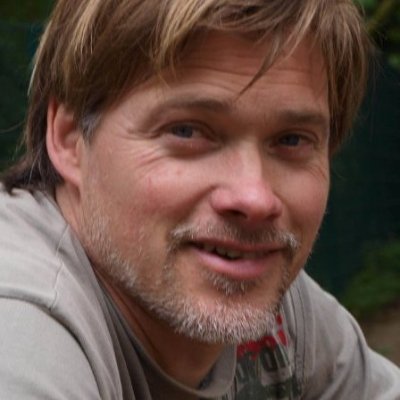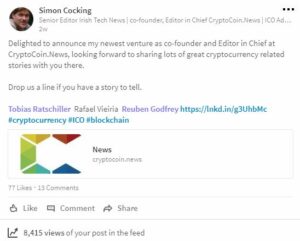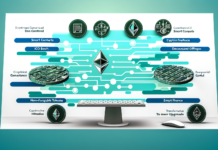On behalf of CryptoCoin.News team, I’m thrilled to introduce you to Simon Cocking, a distinguished persona in the crypto/blockchain space who has joined the CryptoCoinNews as Editor in Chief just a month ago. It’s a great joy and relief to have him onboard managing the multicultural team of writers and helping to bring the most relevant content to the global community. I had a pleasure to work with Simon, and having known him for a month roughly have learned a great deal. Another great joy was interviewing him for CryptoCoinNews.
Maria Popova: Hi Simon, thanks for finding the time for this interview. It’s great pleasure! Let’s start right away… Please share with us your background and how did you get involved with crypto?
Simon Cocking: Background is long and varied – but don’t want to put you to sleep either! Here is a summarised version. I’m Editor in Chief at CryptoCoinNews, and Senior Editor at Irish Tech News, and have freelanced for the Sunday Business Post, Irish Times and other publications. I have spoken for TEDx, Web Summit, Dublin Tech Summit, and other events and conferences in Singapore, Moscow, Tel Aviv, Madrid, Tbilisi, Riga and Helsinki in the last 12 months. I’m also a business mentor, with over 111,000 followers on Twitter and 12,000 LinkedIn connections, and have been named on 10 global Twitter influencer lists in the last 12 months. I have been based in Ireland for over 22 years and have founded or co-founded four companies.
In relation to crypto stories, it is the blockchain that led me to get involved. The blockchain is a super interesting technology, and many businesses are still discovering how it can help them. This is really bleeding edge technology, and it is exciting, fascinating and really interesting to be in a place where you can see it happening, in real time, around you. With so much happening, so fast, there are no stupid questions and it is a great area to be involved in.
MP: What’s your experience as ICO advisor? How do you define the promising projects from the weak ones?
SC: This is a really good question, and a really difficult one to accurately answer 100%. Firstly you need to do your homework, it is your money that you are planning to waste otherwise. Who are the people running the project? What have they done before, what is their pedigree? Do they have any previous history you can find online? Do they have a Linkedin profile, Twitter, website, GitHub account? Is there a way to validate any of the things they say they have done previously. Is their white paper detailed, coherent, logical and trying to do something that is actually feasible, possible, and better still actually happening? Do they respond when you email them, do their answers make sense. Ask your peers too, have they heard of them. A good positive recent example perhaps could be HydroMiner, who are using hydropower to mine Bitcoin and have already leased two power stations. Alternatively, another one, who shall not be named, after an extensive period of research, threw up lots of negative past behavior by its three founders. Would you want to work with people who already have a record of corruption and inappropriate behavior?
It’s still hard to completely know if the project is a scam or a good one. Though common sense will always suggest that if it’s too good to be true, then it probably isn’t worth being involved. At CryptoCoinNews this is something we are hoping to shine a light on, and we hope to produce useful helpful evaluations of upcoming ICOs to help filter the quality from the noise – watch this space.
MP: Speaking about ethics, do you think that the attempts to regulate the crypto and the ICOs are a positive and necessary thing?
SC: Yes they are really important. In terms of the ICOs, no one should lose their money investing in something which turns out to be a scam. If ICOs are going to be a success they need to succeed because they are helping innovative companies to raise money, who had been unable to raise it via traditional lenders. ICOs are not simply about enabling crooks to find a new way to scam people. In terms of regulating crypto in general, it’s a huge and complex issue. The president of Estonia recently commented on the need for governments to find a way to tax digital nomads and remote workers. While no one likes paying tax, it does fund the infrastructure of the countries where we live, health, education, transport, services that we all need and use. So there will need to be some form of regulation. The challenge is to work out what this will be, and how we will achieve it.
MP: Which projects are you currently involved in? What do you find fascinating about them?
SC: I’m in involved with several at the moment. For now, rather than single out individual ones, the ones that appeal are those who have a clear idea of what they are aiming to do, and who are actually pursuing a clear roadmap to achieving it. The sector they are involved in is also the factor, HydroMiner for example, using hydropower, with the goal to lower energy usage is positive. BitIndia, aiming to bring cryptocurrencies to India is very interesting. ClearPoll aim to have tamper-free polling. There are many interesting projects out there, many of which are aiming to achieve social good as well as creating a viable new cryptocurrency. Ventureon Zloadr, DEScrow, AssetToken and Jincor are also doing interesting ICO launches currently too, and are all worth watching.
MP: How did you come about getting on board CryptoCoin.News? How much different is your role there compared to Irish Tech?
SC: Through my online presence, and an introduction via Reuben Godfrey, Director, and Founder of Blockchain Ireland, who is a great guy, doing great things in this space. How different is my role? Well in many ways being a good editor requires the same skills, insights, and hustle, regardless of the subject matter. It’s great to come in and work with a good team of writers, who are smart, and also willing to be flexible and consider new topics and new approaches. Naturally, I have also been learning a lot more about the whole altcoin ecosystem, but luckily some of my Fintech contacts and experience have helped me to get up to speed on the areas that were newer to me. It’s an exciting time, and luckily it’s still only ten years old, so pretty much everyone is still around and contactable. -> just need to pin down Satoshi Nakamoto, though it turns out he may have been one of my lecturers too, based on some of the rumors, right here in Dublin!
MP: Satoshi Nakamoto in Dublin? No way! Tell me more.
SC: He is a brilliant Ph.D. student in Dublin called Micheal Clear, an expert in cryptography and encryption. And I had the pleasure of around 4 hours in his company – really nice, incredibly intelligent guy. Naturally, he said it wasn’t him, but he would say that wouldn’t he? Either way, he is definitely smart enough to have been someone who could have done it!
MP: Unbelievable! You got to have the nerve to be able to remain anonymous for all these years. Speaking about time, where do you see yourself 5/10/20 years from now?
SC:
5 years, – editing and writing about things that are new, interesting, and informative to others.
10 years, – the youngest kid will be 16 going on 17, oh god! That could be a difficult time, but hopefully also a cryptocurrency guru!
15 years, – retired and admiring my fine wine collection, and yet still writing, interviewing people and reviewing interesting books to keep my mind active!
MP: Do you manage to explain blockchain to your kids?
SC: If your phone goes into the sea and dies, you can still see your social media and gaming accounts on another device. That’s what blockchain offers for your property records, bank details, etc.
MP: What is FinTech heading towards?
SC: To becoming a meaningless term. Because it will be a seamless part of everything we do. Your car, your personal ‘thing’ (phone, watch, payments device) will ensure a cash free, hassle-less day. The technology that powers this will be below the hood, and not something we even need to think about. Look at Estonia if you want to see what the near future is already like. Their e-government is exciting, innovation and a clear illustration that the future is already here, just unequally distributed.
MP: How much is the Irish techie community different from the rest of the world from your perspective?
SC: Ah ha, trick question! Ireland does many things well and punches above its weight. But there are also many other parts of the world where very cool things are happening, Singapore, Helsinki, Tel Aviv, Tallinn, Hong Kong, London, Madrid, Porto, SF, NYC and many many more. CryptoCoinNews for example, where the team includes a Brazilian, an Austrian, a Russian, as well as people from Spain, Ireland, UK, and more. This shows that talent is global, just find the people you want to work with. So to be honest, while Ireland is awesome, it’s not unique!
MP: Can you outline the major highlights in your career so far?
SC: Professionally – it’s been a fantastic six years since I retrained as a software engineer after working in a previous life as an educator and public artist. It might seem like a very different career path, but actually, good communication is vital in everything we do. It’s been a delight to work with really smart people. It pushes you, and makes you up your own game, and consequently, this has also taken me to more interesting places and met even more smart people. So it’s been a great adventure, and one I am looking forward to continuing with CryptoCoinNews.
MP: What/how do you aim to contribute to HydroMiner, CryptoCoin.news, the other projects that you’re now working on?
SC: To bring interesting, insightful and helpful stories to the wider world. Then in terms of the advising / mentoring side, to help people get from A to B faster. To leverage the value of my experience from founding 4 companies of my own, and also the many other companies I have also worked with – both successfully, and sometimes less so. As Bill Gates said, success is a lousy teacher. We learn more, and faster sometimes from evaluating what didn’t go right. Better this, than thinking we were successful because we were awesome, when actually it turns out we were just lucky. Still, good luck is also a great asset when you get it, and never forget to appreciate all the good things we have, even when everything doesn’t come off exactly as we might have wished.
MP: Totally agree. Thanks again Simon. Looking forward to our further co-operation at CryptoCoinNews, and seeing the project blooming under your guidance.
















